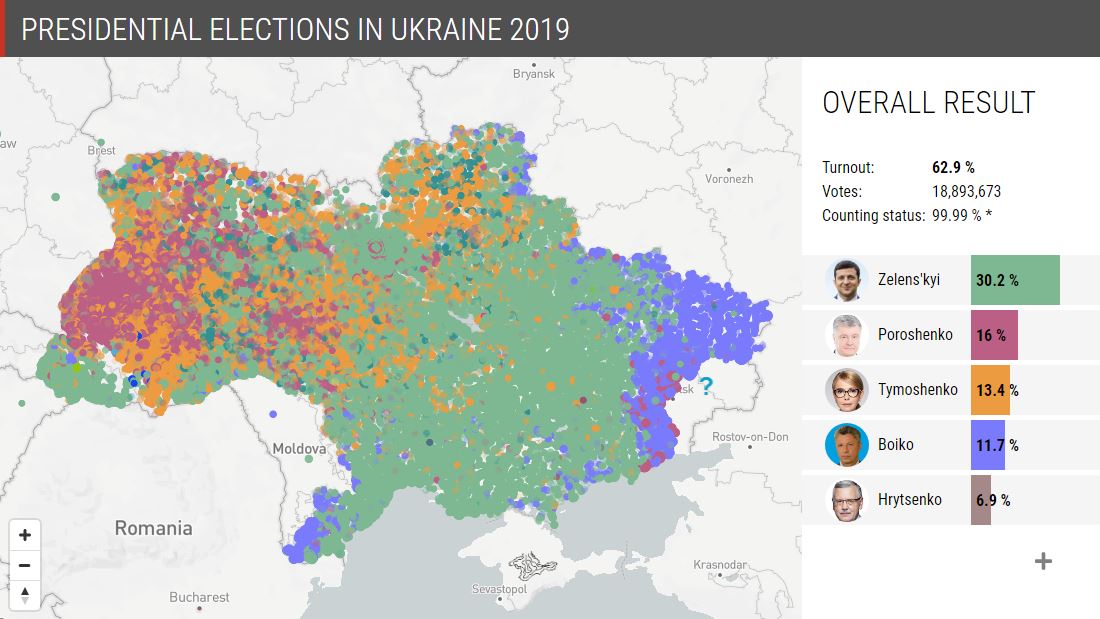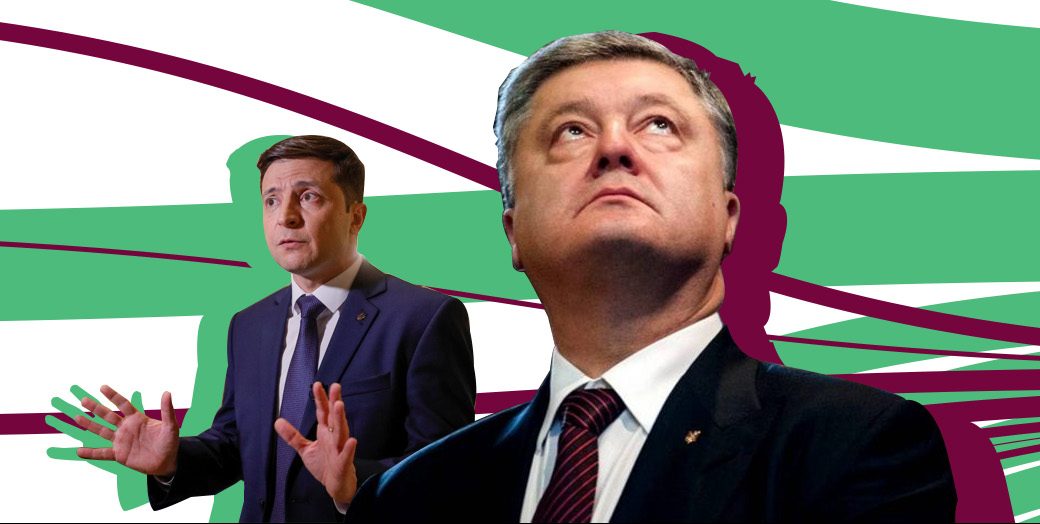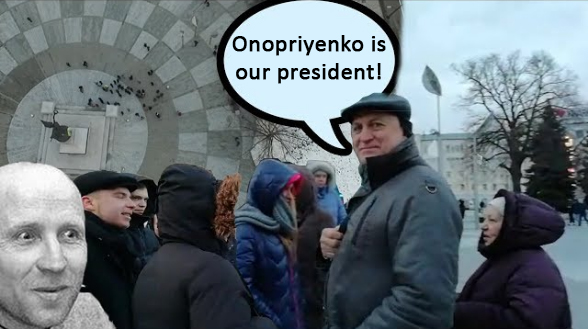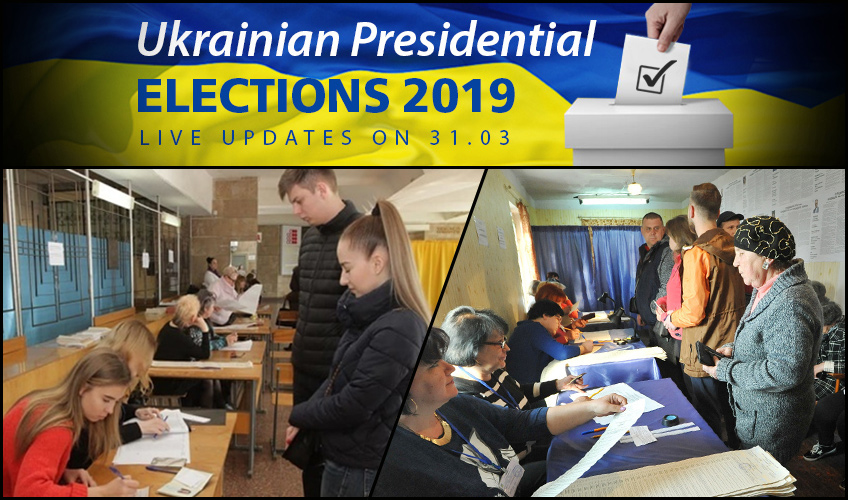By today, there is little doubt that Volodymyr Zelenskyy will win the second round of Ukraine's presidential election on 21 April. The comic-turned-presidential candidate earned a little over 30% of votes in the first round on 31 March, compared to under 16% by his competitor, incumbent President Petro Poroshenko. The latest opinion poll by the Kyiv International Sociology Institute (KIIS) predicts that 48.4% will vote for Zelenskyy and 17% for Poroshenko in the second round. Some believe that Zelenskyy's ratings testify that Ukrainians are tired of the old officials' corrupt ways, while others stress that the choice tells about the infantility of Ukrainian society.

Meanwhile, a variety of sociological polls carried out since the first round allows understanding what is moving Ukrainian voters in their choice.
1. Zelenskyy is the protest vote
Speaking at a press conference on 11 April, Oleksiy Antypovych, Head of the "Rating" sociological group, said that according to their poll conducted over 5-10 April, 41% of Zelenskyy's voters will be, essentially, voting against Petro Poroshenko. This number has grown over the last two months - from 33% in February 2019.

57% of Zelenskyy's voters will be rather voting for him, and not for Poroshenko.
However, only 22% of Poroshenko's voters would vote for their candidate in protest of Zelenskyy; 75% of Poroshenko's voters will be voting for Poroshenko himself.
Speaking to Apostrophe.ua, director of the Kyiv International Institute of Sociology Volodymyr Paniotto said that Zelenskyy's voters express their protest against the existing authorities and system:
"We don't have such specific questions in our polls, but I can say that the majority [of Zelenskyy's voters] are the protest electorate which doesn't want to vote for the old system, the face of which is Poroshenko."
Paniotto explained that Zelenskyy, through his 15 years of jokes about politicians, has created a positive image for himself and made the impression that he knows a lot about the backroom dealings of politics.
"For the majority, Zelenskyy is one of the people who is above politicians. That's why he has authority and the stands in good graces with people; Zelenskyy gives hope, trust in changes for the better," the expert said.
2. Average Zelenskyy voter - a student in the south-east; Poroshenko's - a senior in the west

Data revealed by the national exit poll conducted jointly by the Ilko Kucheriv Democratic Initiatives Fund, KMIS, and the Razumkov Center allows establishing a portrait of the candidates' voter bases in the first round.
Geographically speaking, Zelenskyy's voter base is in the south and central oblasts of Ukraine. Residents of those regions constitute 35.5% and 34% of the entire amount of voters who cast their ballot in favor of this candidate, respectively. At the same time, Zelenskyy received the least amount of votes in western Ukraine and the Donbas, where overtly pro-Russian Yuriy Boiko took the lead. The majority of Poroshenko's voters are from western and central Ukraine.


Zelenskyy's voters tend to live more in large and medium cities than Poroshenko's voters. At the same time, more of Poroshenko's voters come from the Oblast centers and villages than Zelenskyy's.
Zelenkyi's voter base is younger than Poroshenko's - 57% of his electorate is younger than 40. Meanwhile, the incumbent president is dominant among seniors - nearly 30% of his voters are 60+.

Education-wise, more than half of Poroshenko's voters have a college degree or are still studying, compared to 46.2% of Zelenskyy's voters.
When looking at the segment of those with a college degree, 31% of them voted for Zelenskyy and 22% - for Poroshenko.
For the segment of students, Zelenskyy is the absolute leader. In the first round, 42% of college students voted for him, compared to 17% voting for Poroshenko.
That makes a Poroshenko voter more likely to have a finished college degree than a Zelenskyy voter.

According to Vadym Vasiutynskyi, leading researcher of the laboratory of the psychology of masses of the Institute of social and political psychology of the National Academy of Pedagogical Sciences, Zelenskyy was so successful with young people because his image is associated with undecidedness, which young people view positively. "The desire of quick changes is there, despite concrete steps being absent. Basically, to start changing everything starting from Monday," he explains the mindset of Zelenskyy's electorate. In contrast, Poroshenko's voters are older, more inclined towards specificity, and more ready for step-by-step changes.
3. Most voters are poorly informed on what a president does
A poll conducted by the Ilko Kucheriv Democratic Initiatives Fund one week before the first round, during 20-26 March 2019, revealed that the motives for voting for this or that candidate included:
- the personal qualities of a candidate (43% of voters selected this motive)
- the program and propositions (34%)
- available oppo and dirt (27%; this number rose from 6% in August 2018)
- previous activity (26%; this number dropped from 49% in August 2018).
The poll also showed that voters don't know enough about what the president is responsible for, believing that it is the president who is responsible for establishing fair tariffs (32%), or fair salaries and pensions (32%). At the same time, they didn't include such activities as heading the National Security and Defense Council (17%) and awarding state awards (10%), etc. As well, only a minority of voters knew the proposals of their candidate on important questions of domestic and foreign politics, especially Zelenskyy's voters.
4. Voters expect the president to do what he cannot
One of the results of the poll conducted by the Kyiv International Institute of Sociology (KMIS) during 9-14 April was that many voters expect the president to do things which he cannot. Answering the question "What steps do you expect the President to take in the first 100 days?", where respondents could choose three options, Ukrainians chose:
- Decrease utility tariffs - 39.1%;
- Introduce bills to parliament to cancel immunity of MPs, judges, the President - 35.5%;
- Start/speed up investigations into the most resonant corruption crimes - 32.4%;
- Start negotiations with Russia – 23.3%;
- Decrease salaries of top civil servants – 18.4%;
- Start negotiations with the EU and USA regarding Donbas and Crimea – 16.4%;
- Speed up the investigations into crimes committed at Euromaidan – 9.4%;
- Initiate the system of changing the system of parliamentary elections - cancel the majoritarian elections and adopting the proportional system with open lists– 8%;
- To sell the buildings, cars and other assets of the State Management of Affairs – 5.5%;
- Relaunch the anti-corruption organs (National Anti-Corruption Bureau, Special Anti-Corruption Prosecutor) – 5.2%;
- Arrest Russian assets in Ukraine – 4.6%;
- Introduce a draft law on referendums in Ukraine – 4.2%;
- Start negotiations on entering the EU – 3.3%.
Regarding the top three expectations, they are really outside of the president's scope. Price hikes for utilities were introduced after the Euromaidan revolution as part of the demands for receiving an IMF loan, as previously the prices were way below market levels. Although the high prices for electricity, gas, and water have been painful for many Ukrainians, especially those in the low-income segment, it is not the president who establishes them; without the IMF loan, Ukraine would likely default. Bills to cancel immunity of MPs had been regularly introduced in parliament previously but failed to pass, lacking votes. In order to cancel immunity for judges and the president, the Constitution needs to be changed, as previous such bills were overturned by the Constitutional Court. Regarding investigations into corruption crimes, the president cannot interfere in any investigations, as they are regulated by the work of the Prosecutor's office and newly-created anti-corruption infrastructure.
5. Most Ukrainians expect things to get better after the elections
According to a poll by the Rating group held over 12-16 April, 48% of respondents expect things to get better in Ukraine after the elections; 25% don't have any expectations, and 10% expect things to get worse. Residents of the South and East, younger people, and Zelenskyy's voters tend to be more optimistic than the rest.
Read also:





